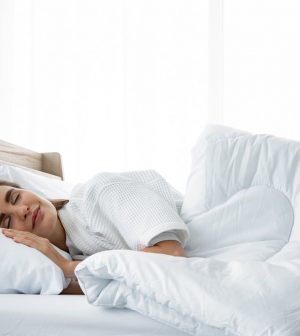- Could Your Grocery Store Meat Be Causing Recurring UTIs?
- Are You Making This Expensive Thermostat Error This Winter?
- Recognizing the Signs of Hypothyroidism
- 10 Strategies to Overcome Insomnia
- Could Artificial Sweeteners Be Aging the Brain Faster?
- Techniques for Soothing Your Nervous System
- Does the Water in Your House Smell Funny? Here’s Why
- Can a Daily Dose of Apple Cider Vinegar Actually Aid Weight Loss?
- 6 Health Beverages That Can Actually Spike Your Blood Sugar
- Treatment Options for Social Anxiety Disorder
Better Sleep Might Bring Less Loneliness

People who feel lonely and socially isolated might benefit from more sleep, especially if they’re a young adult, a new study suggests.
Better sleep is associated with significantly less emotional and social loneliness, researchers report.
Younger adults in particularbenefit from better sleep, but people of all ages report less loneliness after they’ve slept well, results show.
“Loneliness is an urgent public health crisis, and there is a pressing need for providers to better understand and treat it,” said lead researcher Joseph Dzierzewski, vice president of research and scientific affairs at the National Sleep Foundation in Washington, D.C.
The U.S. Surgeon General’s Office warned in 2023 about a public health crisis of loneliness and isolation, researchers noted.
Even before the pandemic, about half of U.S. adults were experiencing loneliness, and the social isolation measures required to protect health likely made matters even worse, the warning said.
“Our results highlight the important role that sleep plays in understanding loneliness across the adult lifespan,” Dzierzewksi said in a university news release. “Perhaps efforts to improve sleep health could have a beneficial effect on loneliness, especially for young people.”
Adults should get about seven hours of sleep each night to promote optimal health and alertness, the American Academy of Sleep Medicine says.
For this study, nearly 2,300 adults with an average age of 44 completed an online sleep health questionnaire. They also filled out a form that measured loneliness.
Efforts to reduce loneliness should include an emphasis on promoting sleep health, researchers said.
“Why younger adults might experience more sleep-related benefits to loneliness than older adults is unknown and intriguing — certainly worth further investigation,” Dzierzewski said.
The findings were published recently in an online supplement to the journal Sleep and they will also be presented Monday at the upcoming annual meeting of the Associated Professional Sleep Societies in Houston.
More information
The U.S. Surgeon General has more on loneliness and isolation.
SOURCE: American Academy of Sleep Medicine, news release, May 30, 2024
Source: HealthDay
Copyright © 2026 HealthDay. All rights reserved.










